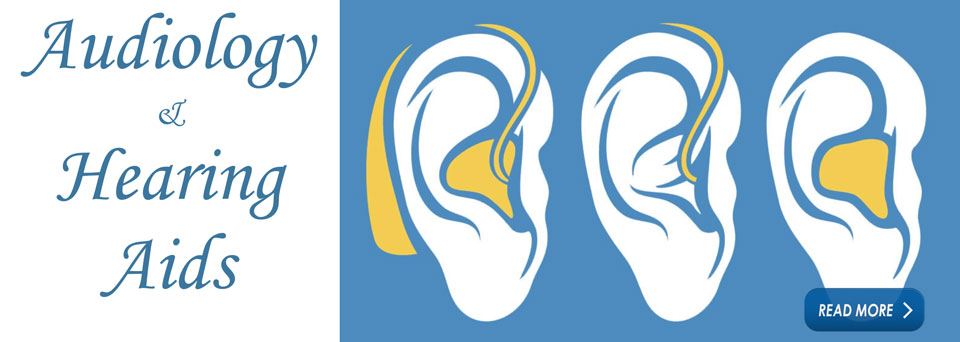
Causes and signs of hearing loss can vary depending on the type and severity of the hearing difficulty a patient is experiencing, as well as other factors such as age, environment, illness, and heredity. As the third most common health issue in the United States (affecting approximately 48 million Americans), hearing loss can cause problems in relationships and dramatically impact quality of life.
Because hearing loss is often a gradual process that happens with age (prebycusis), patients frequently do not recognize that they could benefit greatly from acquiring hearing aids. Knowing the causes and signs of hearing loss can allow patients to be treated promptly by a professional audiologist, such as those at the Hearing Aid Center at Fort Worth ENT.
Understanding Hearing Loss
Normal hearing occurs when sound wave vibrations enter the ears where they are converted into signals that the brain recognizes as sounds. Different sounds create different effects on the tiny hairs in the cochlea (inner ear) and allow the brain to distinguish one type of sound from another. How well you hear is measured by the range of decibels that you can decipher. When loss of hearing occurs, you become unable to discern sounds that measure in lower decibels because they are not as loud.
Degrees of hearing loss:
-
- Normal hearing: Falls in the 0-20 decibel range (as an example, the sound of human breathing is approximately 10 decibels).
- Mild hearing loss (21-40 decibels): Hearing is near normal with some difficulty when background noise is present.
- Moderate hearing loss (41-55 decibels): You often need people to repeat things during conversations in person as well as on the phone.
- Moderately severe hearing loss (56-70 decibels): Normal conversation becomes more difficult to understand.
- Severe hearing loss (71-90 decibels): You require a hearing aid to follow most conversations.
Profound loss of hearing is present when only extremely loud voices and sounds can be heard. At this stage, cochlear implants are often required to hear any normal speaking or sounds.
Signs of Hearing Loss
- The onset of impaired hearing typically presents as difficulty hearing higher pitched sounds such as young children or female voices. The sounds of the letters “s” and “f” may be harder to discern.
- Other common symptoms of hearing impairment include:
- Tinnitus (ringing, roaring, or buzzing in the ears)
- Difficulty following conversations when several people are involved
- Misunderstanding spoken words and/or reacting inappropriately due to mishearing
- Others seem to be mumbling or speaking softly
- Family and friends tell you the T.V. is too loud
- Some patients, depending on the cause of lost hearing, experience pain or pressure in one or both ears and/or vertigo (dizziness). If you are experiencing symptoms of lost hearing, contact the Hearing Aid Center at Fort Worth ENT for audiology and diagnostic testing.
Causes of Hearing Loss

Hearing loss occurs when one or more parts of the ear experience a problem in functionality. Loss of hearing can happen for many different reasons and can come on suddenly or occur gradually (most common). The most frequent cause of hearing loss is due to age.
As we get older, some parts of the ear lose elasticity. The tiny hairs within the ears can become damaged which hinders the conversion of sounds into nerve signals and keeps us from hearing as well as we used to. Just as other parts of the body (eyes, joints, etc..) can begin to deteriorate as we age, so can our ability to hear.
Other causes of hearing loss can include:
- Loud noise: A severe one-time noise can damage hearing suddenly, and frequent exposure to loud sounds, such as power tools, machinery, and airplane engines can harm the ears each time they are experienced. Seriousness of hearing loss usually depends on the volume and length of exposure to these noises. Even musicians, who are exposed to consistently high volume levels of music can suffer from noise-induced hearing loss.
- Perforated or damaged eardrum: Intense pressure (such as from flying or scuba diving), trauma, infections, and extremely loud noises can cause a hole in the eardrum. While most perforated eardrums eventually heal, a large hole in the eardrum may result in mild to moderate hearing loss.
- Ear infections: Fluid can build up in the middle ear and cause temporary loss of hearing, but recurring infections can lead to more serious and long-term hearing problems.
- Medications: Some drugs and chemicals can trigger hearing side effects. Hearing can be affected by:
- Certain antibiotics
- Aspirin
- Some chemotherapy drugs
- Malaria medications
- Loop diuretics
- Several erectile dysfunction medicines
- Illness: Otosclerosis (bone disease that affects the middle ear) and Ménière’s disease (an inner ear disorder) can cause hearing loss. The blood supply to the ears can be affected by other diseases such as diabetes, high blood pressure, and heart disease. High fever can also damage the cochlea.
- Ear wax: Build up can block the canals and prevent sound wave conduction.
- Trauma: A punctured eardrum or fractured skull can cause serious damage to the ears and cause hearing loss.
- Heredity: Genetics can cause a higher susceptibility to hearing loss as certain genes can cause this proneness.
- Tumors or bone growths: Abnormal growths in the outer or middle ear can damage or affect hearing ability.
- Cholesteatoma: Hearing loss can occur from skin that grows in the ear or behind the eardrum often due to chronic middle ear infections.
- Autoimmune disorders: Rheumatoid arthritis, lupus and several other autoimmune disorders can affect hearing.
Treatment for Loss of Hearing
Treatment for hearing loss depends largely on what is causing the hearing problem. For most patients with gradual hearing loss, hearing aids are extremely beneficial. With the advanced hearing aid technology that is now available, patients with hearing loss can enjoy social and professional situations with confidence. Most hearing aid users have a period of adapting to hearing aids after which their hearing ability is significantly improved.
For other causes and types of hearing impairment, treatments can include:
- Surgery: Surgical procedures can be used to treat and/or reverse lost hearing from scar tissue, growths, otosclerosis, and some infections.
- Medication: Antibiotics can clear up ear infections, and Ménière’s disease is typically treated with prescription medicines. If hearing loss is linked to certain medication, other drug options may be the best solution.
- Cochlear implants: Typically used for patients with profound hearing loss, these surgically implanted electronic devices process sound to electrodes in the cochlea allowing signals to be sent to the brain. Rather than amplifying sounds, cochlear implants do the work of the damaged cochlea by transferring sounds to the hearing nerves.
Preventing Hearing Loss
The best way to prevent loss of hearing is to protect your ears. If you are frequently exposed to loud noises, wearing earplugs is the best way to keep from damaging your hearing. Even lawn mowers, power tools, vacuum cleaners, and loud music can cause damage to unprotected ears. While these situations cannot always be avoided, keeping earplugs nearby can benefit your hearing long-term.
If you have questions about the causes and signs of hearing loss or are experiencing difficulty with your hearing, contact the audiology professionals at Fort Worth ENT for an evaluation.
Frequently Asked Questions
Yes, hearing loss can occur in children as well as adults. While age-related hearing loss (presbycusis) is common in older adults, children can experience hearing difficulties due to genetics, ear infections, trauma, or exposure to loud noises. Early detection in children is especially important to support speech, language, and learning development.
Gradual hearing loss typically develops over years, often making it difficult for patients to notice changes at first. Sudden hearing loss occurs within hours or days and may indicate an infection, trauma, or other medical issue. If you experience sudden hearing difficulties, it is crucial to see an audiologist or ENT immediately.
Yes, some medications and chemicals can impact hearing. These include certain antibiotics, chemotherapy drugs, loop diuretics, high-dose aspirin, malaria medications, and some erectile dysfunction treatments. If you notice hearing changes after starting a new medication, consult your healthcare provider promptly.
Treatment depends on the underlying cause. Gradual hearing loss is often managed with hearing aids, which amplify sound and improve communication. For more severe cases, cochlear implants or surgical interventions may be necessary. Ear infections, wax buildup, or medication-related hearing issues can sometimes be treated medically or surgically to restore hearing.
Protecting your ears from loud sounds is key. Use earplugs or noise-canceling headphones when exposed to loud environments such as concerts, power tools, or lawn equipment. Regular hearing check-ups, limiting exposure to high-volume music, and promptly treating ear infections can also help maintain hearing health.


